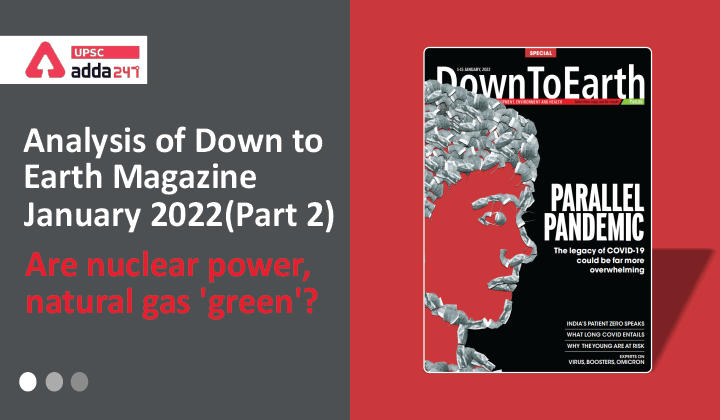Table of Contents
Are nuclear power, natural gas ‘green’?
Relevance
”GS 3: Environmental Pollution & Degradation, International Treaties & Agreements”
Introduction
- The European Commission has proposed plans to label some gas and nuclear power as green.
- The proposal argues that gas and nuclear are key to helping transition to cleaner power.
- It comes months after countries pledged to keep temperature rises within 1.5C at the COP26 climate summit.
- On December 30, South Korea included liquefied natural gas (LNG) in its list of green fuels to cut emissions.
What is the controversy?
- Amid a global race to transition away from fossil fuels to cleaner sources of energy, the EU’s plan to classify natural gas and nuclear power plants as environment friendly or “green” investments has drawn up controversy.
- Gas is a polluting fossil fuel, but it is still considered a bridge technology by the EU to reach a cleaner energy future.
- The plans would have a huge impact on nuclear-fired economies like France and on Germany’s gas-fueled power plants since they might have had to fundamentally change their strategies.
- The announcement has sparked a debate among several countries, including the EU’s own members. They believe an increased focus on nuclear energy would drastically increase the region’s radioactive waste.
- Energy groups and non-profits also criticised South Korea’s move, saying LNG is in essence a fossil fuel and its inclusion in the green list would make the country’s climate goals prone to loopholes. South Korea has since clarified that LNG should only be seen as a “transition” fuel toward other cleaner energy sources.
What is the EU’s Plan?
- It is necessary to recognise that the fossil gas and nuclear energy sectors can contribute to the decarbonisation of the Union’s economy,” the Commission’s proposal says.
- Under the proposal, only gas and nuclear plants with the highest standards would be considered green. Nuclear plants would also have to have strict waste disposal plans, Deutsche Welle reports. While gas plants would have a limit of how much carbon dioxide is released per kilowatt-hour of energy produced.
- If a majority of EU members back the proposal then it will become law from 2023.
Which countries are in favour and which are against?
- France had reportedly pushed for nuclear power to be included. The country relies on nuclear energy for 70% of its electricity, although this will be cut to half over the next 15 years.
- France has also pledged to reduce its reliance on nuclear power by shutting down 12 nuclear reactors by 2035.
- The move has been criticised by Germany, which is in the process of phasing out nuclear completely and only has a few plants remaining.
- German Environment Minister Steffi Lemke described the proposal as “wrong”, adding that nuclear energy could lead to environmental disasters and large amounts of nuclear waste.
- Economy and Climate Protection Minister Robert Habeck called the plan “greenwashing”, saying it “waters down the good label for sustainability.”
Conclusion
Nuclear power remains extremely controversial in Europe, where many are still vividly remember the fear following the 1986 nuclear accident in Chernobyl, Ukraine. Although nuclear plants release few pollutants into the air, which have made them an option as nations around the world seek clean energy to meet climate change targets yet calling it green is not in favour of the planet considering the risks it carries for the environment.



 TSPSC Group 1 Question Paper 2024, Downl...
TSPSC Group 1 Question Paper 2024, Downl...
 TSPSC Group 1 Answer key 2024 Out, Downl...
TSPSC Group 1 Answer key 2024 Out, Downl...
 UPSC Prelims 2024 Question Paper, Downlo...
UPSC Prelims 2024 Question Paper, Downlo...




